Cá Kho Làng Vũ Đại (Braised Fish of Vu Dai Village)
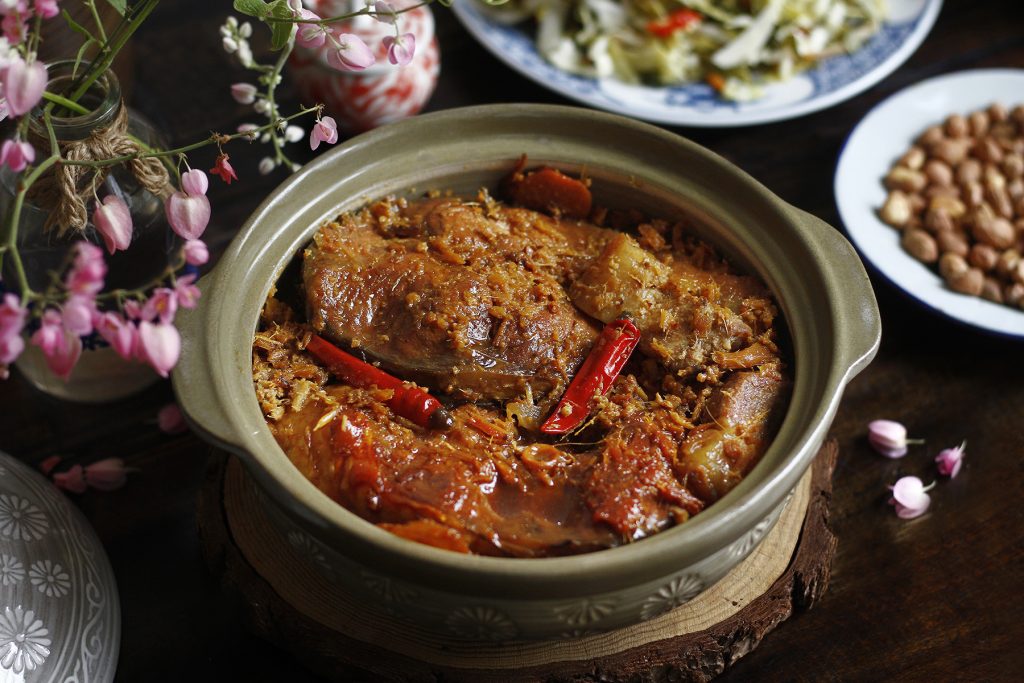
Ingredients
-
1 whole carp (~1.5 kg)
-
500g pork belly
-
500ml tea leaf water
-
4 stalks of galangal
-
4 stalks of sugarcane
-
300ml sugarcane juice
-
200g mixed herbs (e.g., lettuce, perilla, cilantro)
-
5 chili peppers
-
1/4 tsp lime juice
-
1 tsp caramel sauce (nước màu)
-
5 tbsp fish sauce
-
Common spices: salt, sugar, seasoning powder, MSG, black pepper
How to Choose Fresh Carp (Cá chép)
-
Select long and thick-bodied fish, as these tend to have firmer, sweeter meat.
-
Choose live carp with clear eyes and light pink gills.
-
The fish should have bright red skin, tightly attached scales, and a firm body when touched.
-
The belly should be intact—not bloated or ruptured.
-
Avoid fish that are already dead, have bulging or cloudy eyes, a bloated belly, loose scales, or an off-putting odor.
How to Choose Fresh Pork Belly (Thịt ba chỉ)
-
Look for pork with a light pink hue, a naturally meaty smell, and a balanced layer of fat and lean.
-
Press the meat with your finger—fresh pork should feel firm and spring back quickly.
-
Avoid cuts with a sour or strange smell, mushy texture, yellowish fat, poor elasticity, or dull, slimy surfaces.
Nutritional Information
For: Meat-eater
Calories per serving: ~520 kcal
Key Nutrients:
1. Omega-3 fatty acids
Source: carp
Benefits: heart health, brain support
2. Collagen & B vitamins
Source: pork belly
Benefits: skin elasticity, energy production
3. Antioxidants
Sources: tea leaf water, herbs, galangal
Benefits: anti-inflammatory and detoxifying
4. Capsaicin
Source: chili
Benefits: boosts metabolism and circulation
5. Polyphenols
Source: galangal
Benefits: antimicrobial and digestive support
1. Prepare the fish
-
Clean the carp thoroughly with water, cut into thick slices, and soak in diluted green tea to remove any fishy smell.
-
Rinse again and drain well.
💡 Tip: If you don’t have green tea, use salt or vinegar to clean and deodorize the fish.



2. Prepare other ingredients
-
Wash and peel the galangal. Divide into two portions: slice one and finely crush the other. Squeeze the crushed galangal for juice, keep both juice and pulp.
-
Clean and split the sugarcane lengthwise.
-
Wash and dry the herbs for serving (lettuce, perilla, coriander, etc.).
💡 Tip: You can substitute sugarcane with fresh sugarcane juice to save time.




3. Make caramel sauce and marinate the fish & pork
-
Marinate the carp with 4 tsp galangal juice, mix well.
-
For the caramel sauce: heat 40g sugar over medium heat until it turns amber. Add 40ml water and stir until dissolved.
-
In a bowl, mix 200ml water with 2 tbsp caramel sauce, 1½ tsp salt, 3 tsp seasoning powder, and 3 tbsp fish sauce.
-
Pour this marinade over the fish and let it sit for 1–2 hours.
For the pork:
-
Rinse the pork belly with diluted salt water. Slice thinly and marinate with 1 tsp caramel sauce, ½ tsp salt, 1 tsp seasoning powder, and 1 tbsp fish sauce. Let it marinate for 1–2 hours.
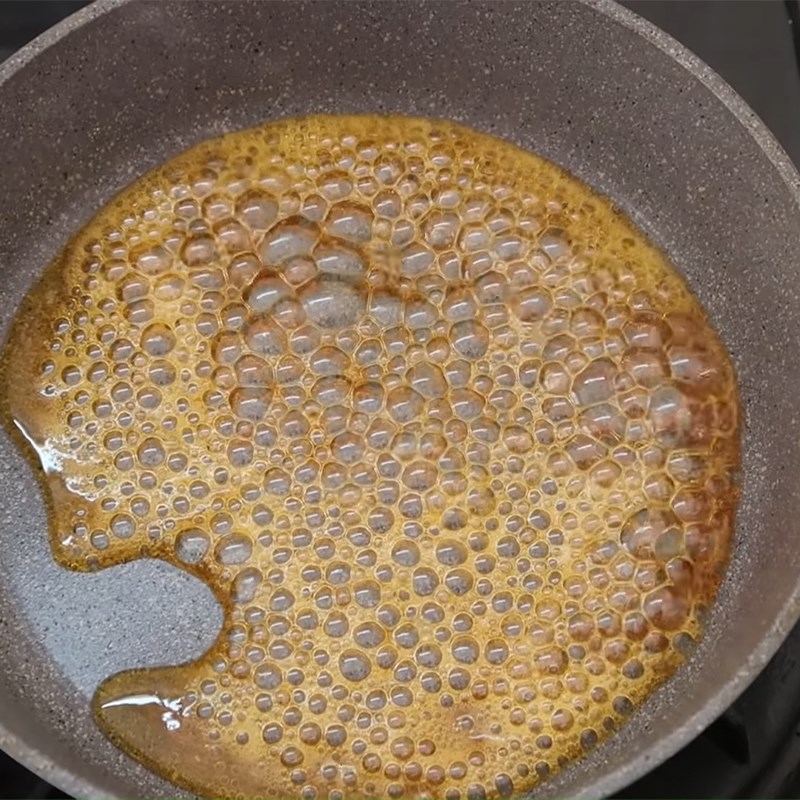
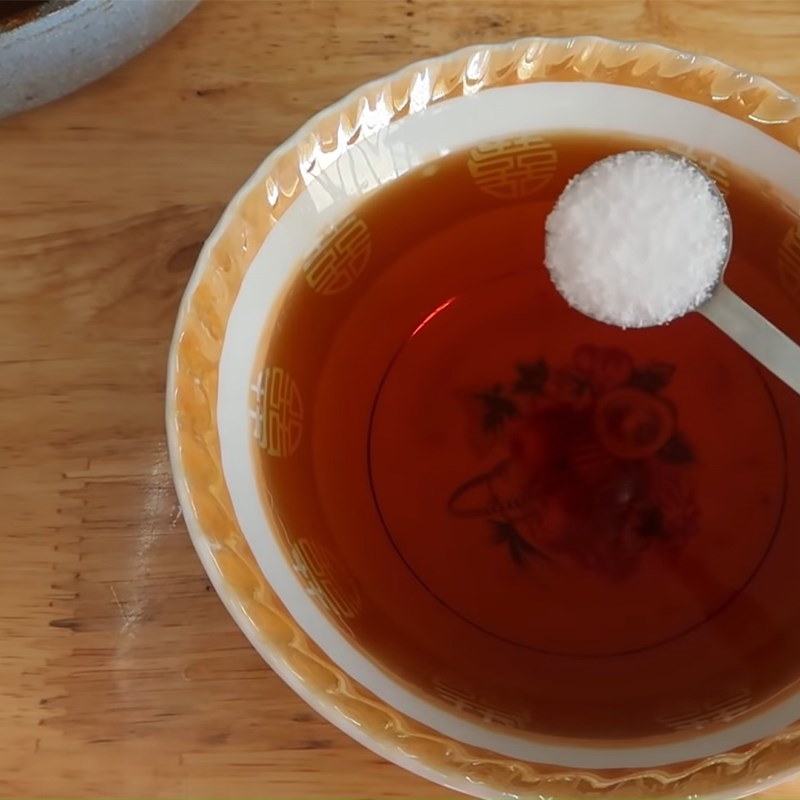
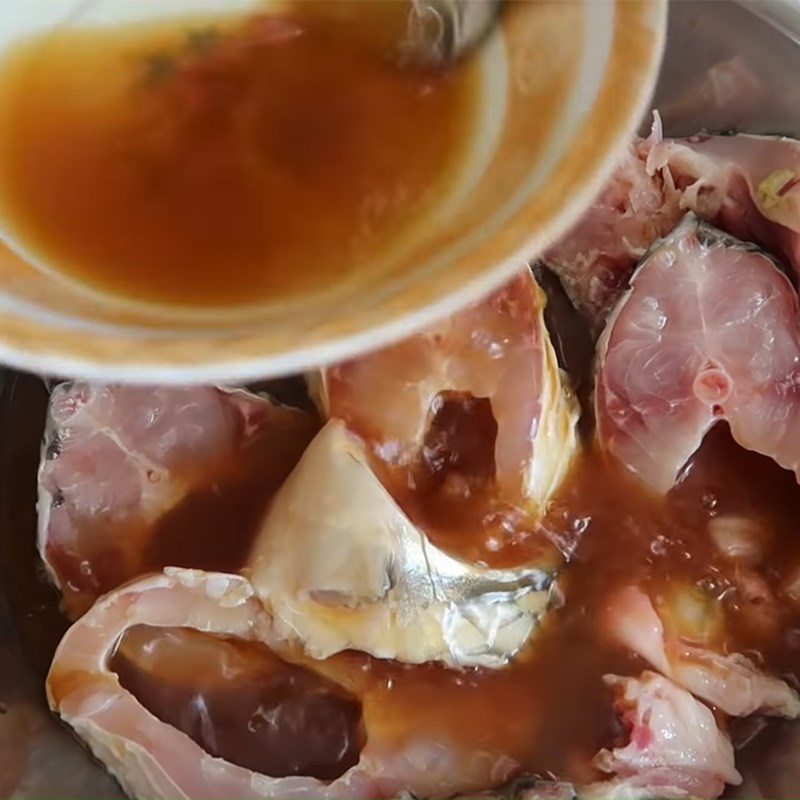
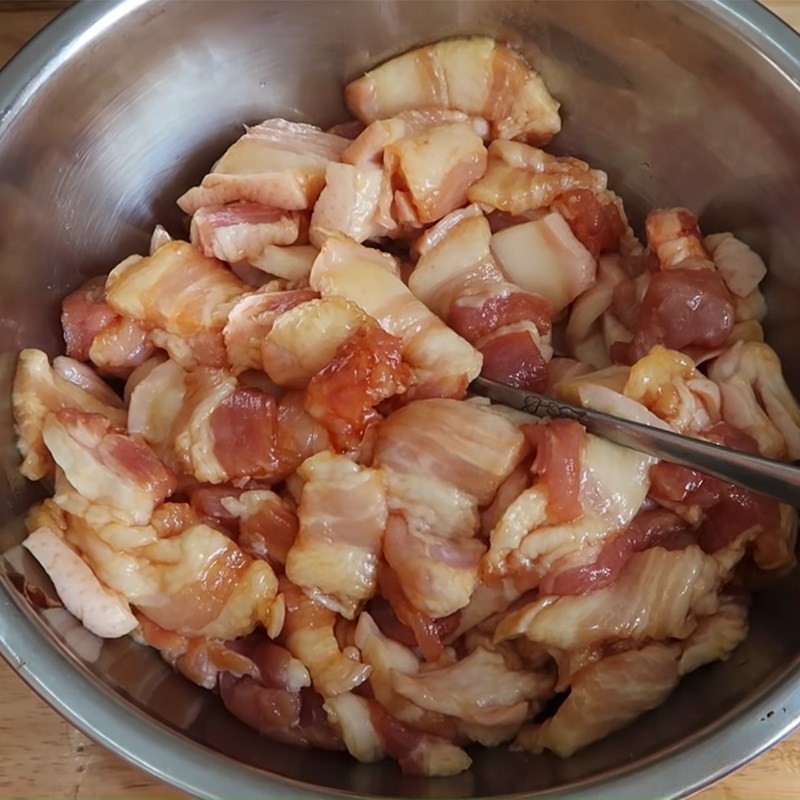
4. Braise the fish
-
Line the bottom of a clay pot or thick-bottom pot with sugarcane sticks and galangal slices. Add layers of marinated fish and pork, then top with the galangal pulp.
-
Mix the marinade with 200ml sugarcane juice and ¼ tsp lime juice, then pour into the pot.
-
If the sauce doesn’t cover the fish, add some filtered water.
-
Bring to a boil over medium heat, then reduce to low and simmer for 2 hours until the liquid reduces and the fish is tender.
-
Add 1 tbsp seasoning powder and 1 tbsp fish sauce. Adjust seasoning, then turn off the heat.
💡 Tip: Skim off the foam during simmering for a clearer broth and better flavor.




5. Final dish
The finished Vũ Đại-style braised carp has a rich caramel color and an irresistible aroma. The fish is tender and flavorful, infused with galangal and pork belly essence. It pairs wonderfully with steamed rice, fresh herbs, or vermicelli.
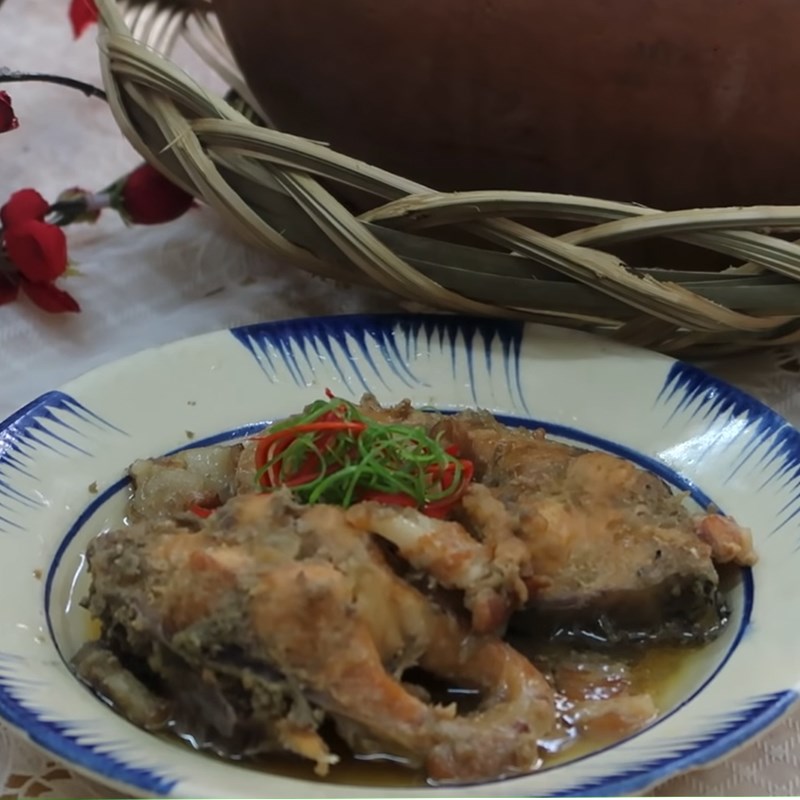
A Taste of Northern Vietnamese Tradition
Braised Fish of Vu Dai Village is a dish that speaks softly but profoundly — of home, patience, and the enduring warmth of Vietnamese family life. It originates from Vũ Đại, a small village nestled in Hà Nam Province, where every household once carried the scent of woodsmoke and simmering fish in the days before Tết. To the people there, Braised Fish of Vu Dai Village is a way to preserve both ingredients and memories, to bind generations through the shared rhythm of cooking.
In its essence, the dish is deceptively simple: fresh carp, galangal, sugarcane, and fish sauce. Yet in the hands of those who tend the clay pot, it becomes something extraordinary. The carp, cleaned and marinated overnight, is gently placed in earthenware pots layered with slices of galangal and sugarcane. Homemade fish sauce, caramelized pork fat, and coconut water are poured in until the liquid barely covers the fish. Then begins the long wait — twelve, sometimes even sixteen hours — as the pot simmers slowly over charcoal embers.
The aroma that rises is unmistakable: smoky, sweet, and deeply savory, laced with the sharp warmth of galangal and the caramel depth of fish sauce reduced to syrup. The sound of the bubbling pot becomes almost meditative — a quiet music that fills the home and seeps into one’s memory. By the time it is done, the fish has transformed: its flesh firm yet tender, infused with flavor down to the bone, and coated in a glossy, amber glaze that clings to every strand of rice it touches.
For the people of Vũ Đại, this dish holds stories. Of grandmothers waking before dawn to tend the fire. Of fathers sending clay pots of braised carp to their children working far away. Of neighbors gathering around to share a meal that tastes of earth, smoke, and belonging. The pot itself — blackened with years of use — carries its own lineage, as each new batch absorbs a little of the last, deepening in color and character.
Even today, Braised Fish of Vu Dai Village remains a symbol of continuity. Amid modern convenience, its slow-cooked nature feels almost defiant — a quiet resistance to haste, an insistence that true flavor demands time, devotion, and heart. Each bite holds the landscape of northern Vietnam: the river’s freshness, the village’s warmth, and the patient hands that stir the past into the present.
To taste it is to be reminded that food, at its truest, is not only nourishment — it is memory simmered over fire, the scent of care rising with the steam, and the taste of home that lingers long after the meal is done.

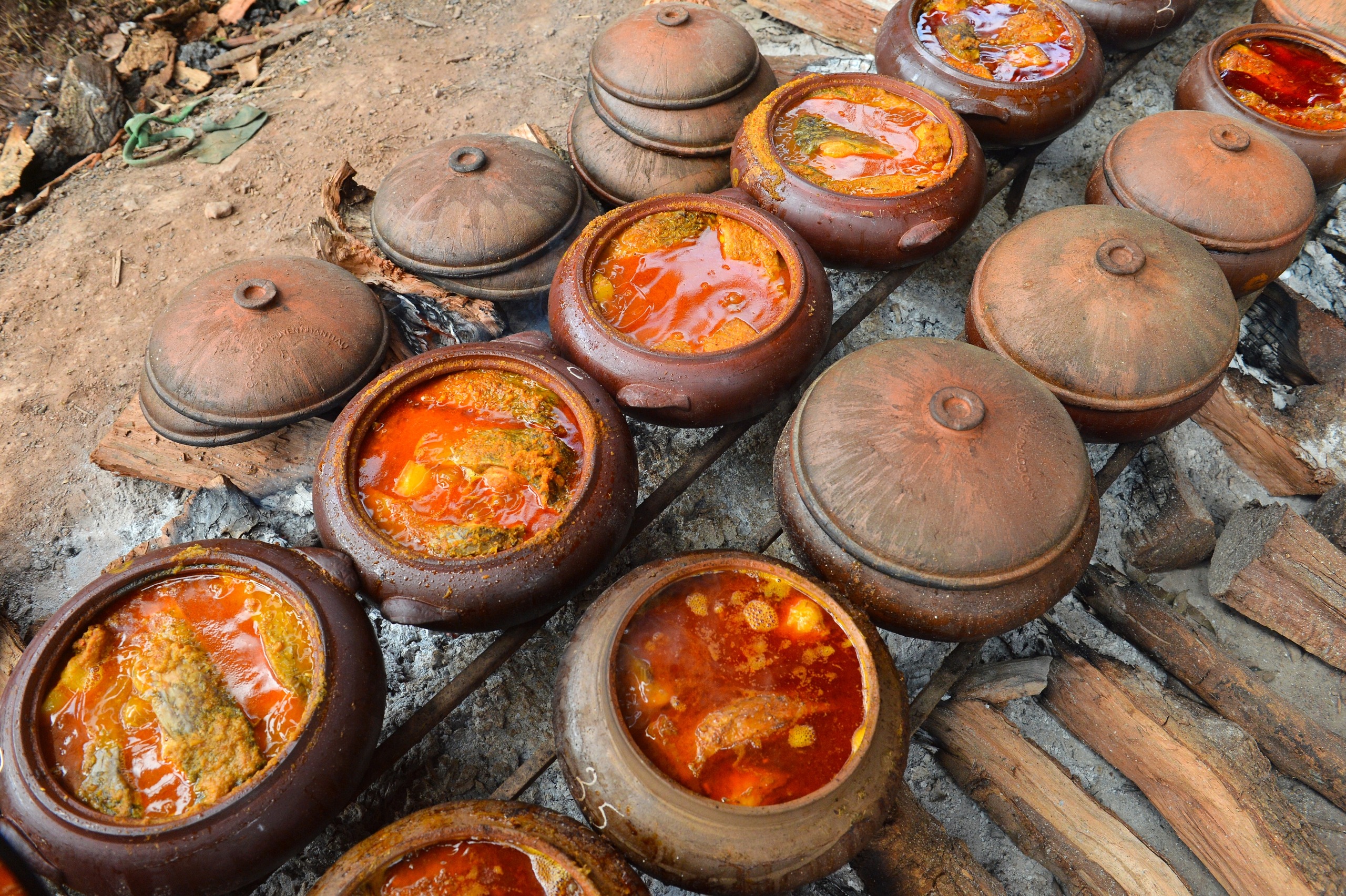
(Braised Fish of Vu Dai Village)
